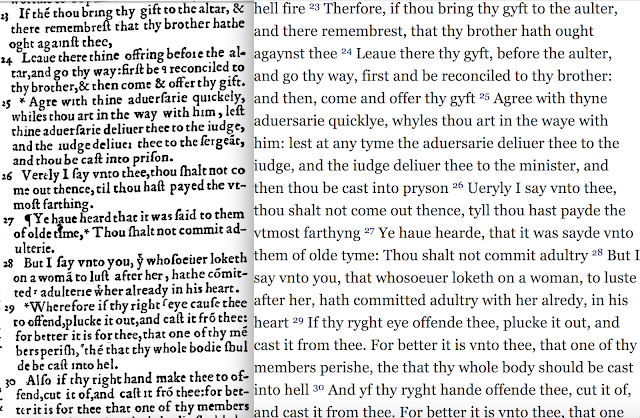A TALE OF HAMLET & TWO BIBLES: BISHOPS & GENEVA
A TALE OF HAMLET & TWO BIBLES: BISHOPS & GENEVA
In Shakespeare’s time, the approved Bishops’ bible was used in church; the inexpensive Geneva translation was used at home.
Specific words (unlike paraphrase) can point to specific translations:
Regarding his accidental killing of Polonius (3.4), Hamlet says,
“...heaven hath pleased it so,/ To punish me with this and this with me,/ That I must be their scourge and *minister*.”
Hamlet's phrase, “scourge and minister,” uses "minister" in the same sense as the Bishops’ bible Mt 5:25 (in the picture below, right): a minister of justice carries out a judge’s sentence.
Because church attendance was required (and absence punishable by fines), Shakespeare would have heard this word, used in this biblical context, every year, all his life.
In the Bishops' bible, the word "minister" is used instead of the word "sergeant, which appears in the same place in the Geneva bible.
But when Hamlet says, “this fell sergeant, Death,/ Is strict in his arrest” (5.2) he is thinking of the *sergeant* in the Geneva translation of Mt 5:25
(on the left, below: looks like “fergeat” in the old style typesetting).

Note also how quckly after this passage we get, "If thy right hand offend thee, cut it off!..." Hamlet alludes to this in his mother's closet when she says he has cleft her heart in twain, telling her to throw away the worser part.
For more on "fell sergeant" and Mt 5:23-26 Geneva:
https://pauladrianfried.blogspot.com/2018/02/hamlet-fell-sergeant-death-matt-523-26.html
~~~~~~~~~~~~~~~~~~~~~~~~~~~~~~~~~~~~~~~~~~~
Links to a description of my book project:
On LinkedIn: https://lnkd.in/eJGBtqV
On this blog: https://pauladrianfried.blogspot.com/2017/05/hamlets-bible-my-book-project-im.html
[Originally posted around the week of 2/26/18
on LinkedIn]
In Shakespeare’s time, the approved Bishops’ bible was used in church; the inexpensive Geneva translation was used at home.
Specific words (unlike paraphrase) can point to specific translations:
Regarding his accidental killing of Polonius (3.4), Hamlet says,
“...heaven hath pleased it so,/ To punish me with this and this with me,/ That I must be their scourge and *minister*.”
Hamlet's phrase, “scourge and minister,” uses "minister" in the same sense as the Bishops’ bible Mt 5:25 (in the picture below, right): a minister of justice carries out a judge’s sentence.
Because church attendance was required (and absence punishable by fines), Shakespeare would have heard this word, used in this biblical context, every year, all his life.
In the Bishops' bible, the word "minister" is used instead of the word "sergeant, which appears in the same place in the Geneva bible.
But when Hamlet says, “this fell sergeant, Death,/ Is strict in his arrest” (5.2) he is thinking of the *sergeant* in the Geneva translation of Mt 5:25
(on the left, below: looks like “fergeat” in the old style typesetting).

Note also how quckly after this passage we get, "If thy right hand offend thee, cut it off!..." Hamlet alludes to this in his mother's closet when she says he has cleft her heart in twain, telling her to throw away the worser part.
For more on "fell sergeant" and Mt 5:23-26 Geneva:
https://pauladrianfried.blogspot.com/2018/02/hamlet-fell-sergeant-death-matt-523-26.html
~~~~~~~~~~~~~~~~~~~~~~~~~~~~~~~~~~~~~~~~~~~
Links to a description of my book project:
On LinkedIn: https://lnkd.in/eJGBtqV
On this blog: https://pauladrianfried.blogspot.com/2017/05/hamlets-bible-my-book-project-im.html
[Originally posted around the week of 2/26/18
on LinkedIn]
Comments
Post a Comment